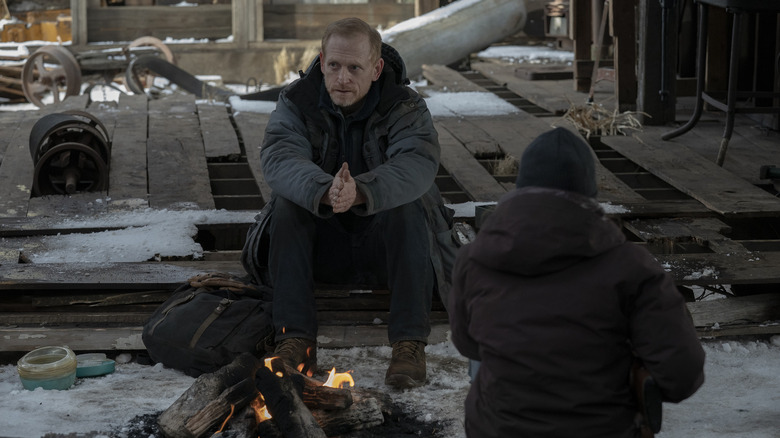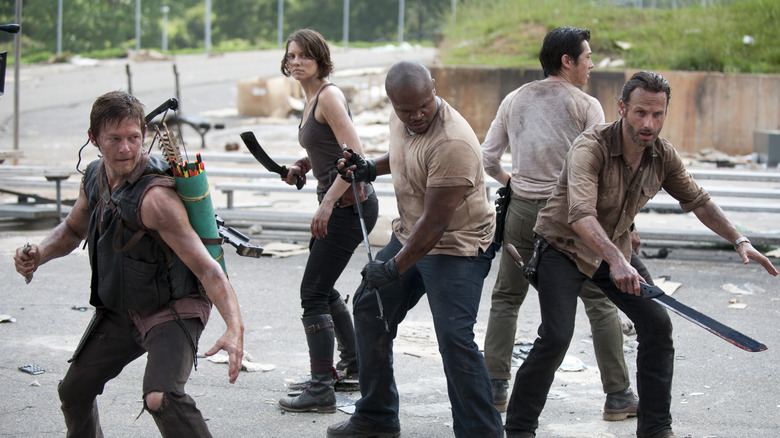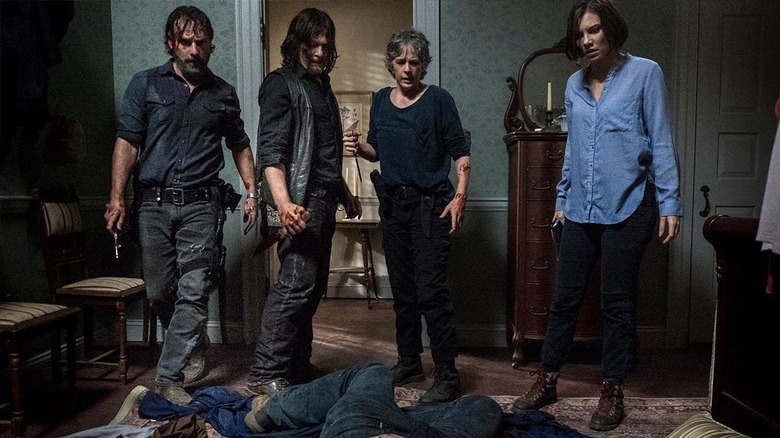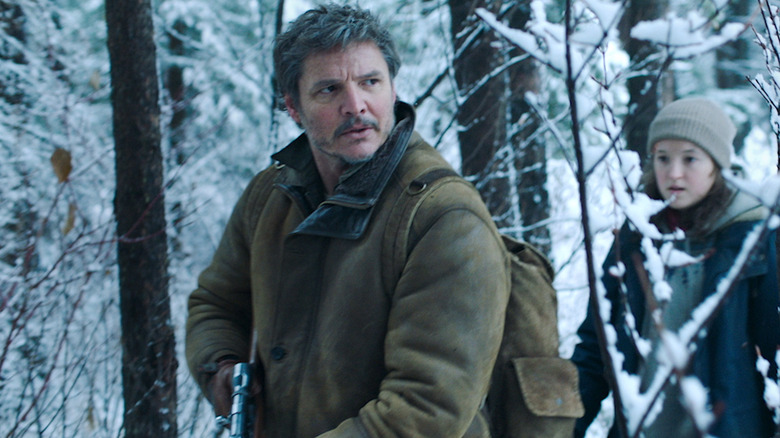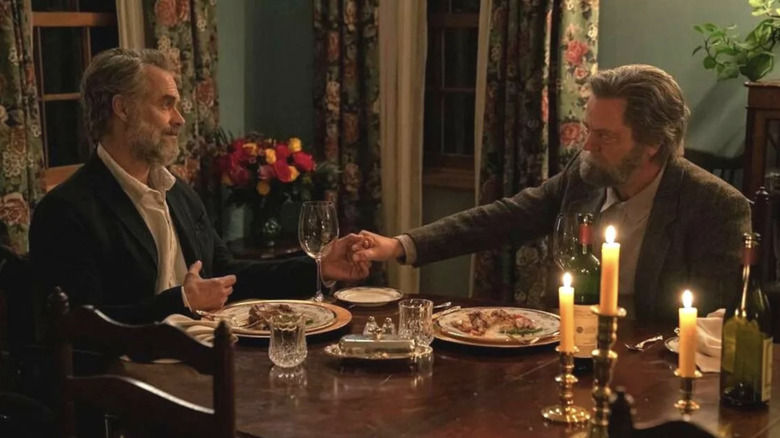The Pacing In The Last Of Us Feels Like A Direct Response To The Walking Dead
This article contains spoilers for "The Last of Us" episode 8 and the video game source material.
In anticipation of the penultimate episode of "The Last of Us" season 1, it made sense to be a little concerned. The runtime was just under 50 minutes — over 20 minutes shorter than the Bill/Frank episode — and as someone who's played the video game, I wasn't sure how the show could possibly cover the entire David storyline in so little time.
After all, the winter section of the game was always my favorite, and not just because of how cool Ellie's bow and arrow is to shoot with. Story-wise, this is the game's emotional climax, the section where the game fully embraces the idea that Joel and Ellie are an unstoppable duo who will be there for each other no matter what. When Joel calls Ellie "baby girl" at the end, just as he called Sarah while she was bleeding out in the first episode, their relationship has now fully evolved into the father/daughter dynamic we all knew it was heading towards. Even beyond the introduction (and subsequent resolution) to David's whole creepy, cannibalistic deal, the game gives the show a ton of material to work with here, and I genuinely didn't know if 50 minutes was enough.
But sure enough, the HBO show gave us an episode that takes full advantage of every single minute it has, successfully covering all the same beats of the game and making it look easy. Sure, they cut out most of the action sequences from this section of the game, but emotionally it all works. So, why does it feel so surprising that the show could cover so much ground in a regular-length episode? Personally, I blame "The Walking Dead."
A different approach to the zombie apocalypse
Throughout the 11 seasons of "The Walking Dead," the show covers all sorts of themes and storylines reminiscent of what we'd later see in "The Last of Us." The moral quandaries that come with protecting yourself at the expense of others? The idea that other humans can be even more dangerous than the zombies? The nuances of parenthood in a world where your child could easily die at any moment? Both shows are fascinated with these questions. The difference, of course, is that "The Walking Dead" took a more long-winded approach to them.
Take the whole cannibal arc in seasons 4 and 5, for instance. "The Walking Dead" spent seven episodes building up anticipation for this mysterious settlement called Terminus. Then it ended its season 4 finale with all our main characters trapped by cannibals, making us wait five months for them to find their way out in the season 5 premiere. Although Rick's group kills most of the cannibals, a group of them survive and stir up trouble for two more episodes, before they're finally killed for good.
This is one of the shorter story arcs in "The Walking Dead," to the point where a lot of fans at the time were pleasantly surprised at how quickly things concluded, especially compared to the 24-episode arc around the Governor. Yet when it's time for "The Last of Us" to do its own cannibal town storyline, the show is in and out in 50 minutes. David as a character doesn't get half a season's worth of build-up, and now we're never going to hear from him ever again. Isn't that refreshing?
To be fair to The Walking Dead
Admittedly, the lack of focus in "The Walking Dead" is by design. In the introduction to the first volume of the comics, the creator Robert Kirkman wrote, "'The Walking Dead' will be the zombie movie that never ends. Well ... not for a good long time at least." The comics and the show both promised to be big, sprawling epics filled with hundreds of characters, each of them dealing with the zombie apocalypse one day at a time. There was no real attempt to find a cure, nor was there ever a single unifying narrative intended to tie the whole show together. The show was simply about ongoing survival, plain and simple. The lack of an endgame was (for a while, at least) part of its charm.
The first season of "The Last of Us," meanwhile, is incredibly focused. It's about two characters, not dozens, and they're out to achieve a very specific, tangible goal, one they'll undoubtedly reach (for better or worse) by the end of this season. So far, the show hasn't been completely disinterested in the idea of how society at large will evolve in the apocalypse, but it's been content to let those questions play out beyond our direct view. FEDRA and the Fireflies fight each other all throughout what's left of America, but neither Joel nor Ellie seems to have strong feelings about either. So far, "The Last of Us" isn't about rebuilding society; it's a simple story about two strangers slowly becoming like family to one another, while others attempt to rebuild society in the background.
A different TV landscape
As a result of all this, we know that "The Last of Us" is never going to run as long as "The Walking Dead." Even if there weren't only two video games for the show to adapt, this would still be clear. When a show is this focused, when it's continually barreling forward through its story instead of gradually establishing a status quo, it's clear that it has no intent to stay around for as long as it can. Even when Ellie and Joel aren't on screen, it doesn't ever feel like a moment's being wasted.
"The Last of Us" feels like a clear indicator of how much prestige TV (or at least, shows that are aiming for prestige TV status) have changed over the past 15 years. "The Walking Dead" aired at a time when it was normal for successful shows to go on for as long as the ratings allowed. Director Joel Coen recently complained about the medium of TV, saying, "So much of television has a beginning, a middle, a middle, a middle, a middle, until the whole thing dies of exhaustion," but honestly, the criticism feels about 10 years too late.
Whereas sitcoms like "Friends" and "How I Met Your Mother" went on for 9-10 seasons, today's acclaimed sitcoms like "Ted Lasso" and "The Good Place" have been content to end on seasons 3 or 4, with the episode counts of each season being far lower. The writers of "Lost" famously had to fight ABC to get them to end the show after "only" six seasons, but the acclaimed series "Succession" is now happily ending of its own accord in season 4, even though no one would've complained if they'd chosen to keep going.
A smaller-scale show, for better or worse
The difference in pacing and scale between "The Walking Dead" and "The Last of Us" isn't exactly surprising, but it's notable because each show is the big zombie series of its time, which gives us perhaps the clearest example yet of how the TV landscape has changed. In hindsight, "The Walking Dead" seems almost perfectly designed to be a ratings hit in the early 2010s; "The Last of Us" seems like exactly the sort of show that would particularly do well today, in a time where 8-10 episode seasons are the norm, and when ending after just a handful of seasons isn't seen as a sign of a failure.
There's a lot that "The Walking Dead" deserves credit for; at its best, it was a riveting series filled with compelling characters accomplishing feats of badassery and dealing with tough moral quandaries. The fact that there were so many different characters helped to give it an air of unpredictability, as these characters would often converge in smart, unexpected ways throughout the series. The series' format also gave minor characters the time to quietly, subtly evolve in realistic-feeling ways, something that "The Last of Us" season 1 can't really do because most of the characters tend to die in the same episode they're introduced.
The accomplishments of "The Walking Dead," and the benefits of its approach, shouldn't be ignored. It's just that so much of what made "The Walking Dead" drag, from the characters' long-winded monologues to the occasional sense of aimlessness, is almost entirely absent from "The Last of Us" so far, and man, is that refreshing to see.
